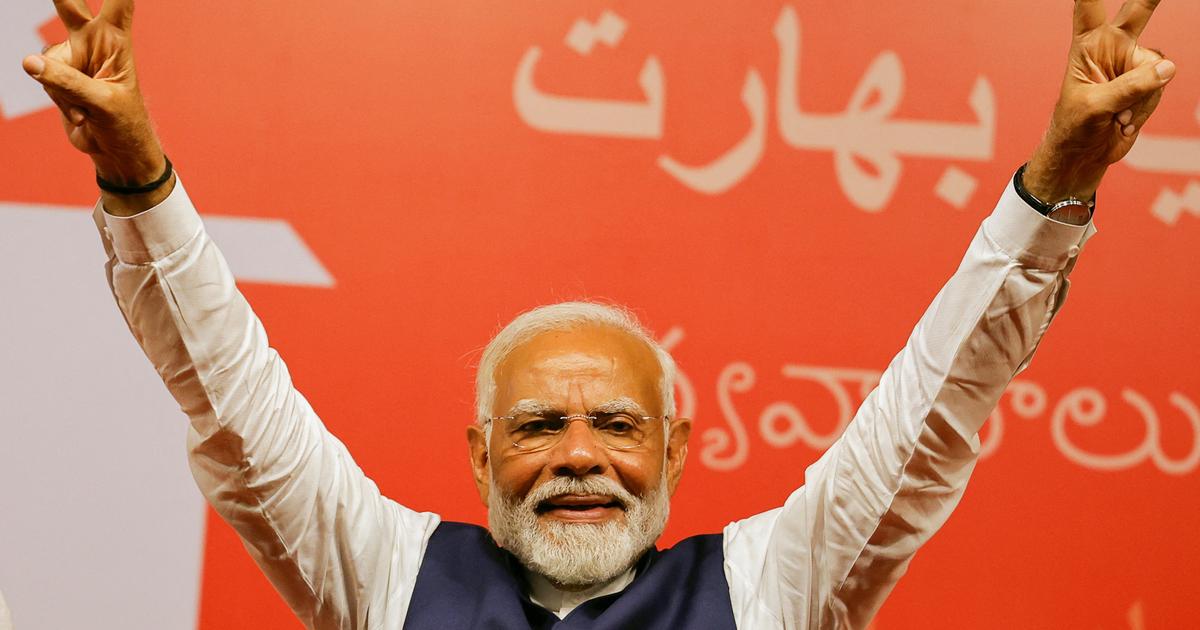Modi Faces Uncertain Future After Election Setback
In an unexpected turn of events, Indian Prime Minister Narendra Modi's Bharatiya Janata Party (BJP) failed to secure an absolute majority in the recent legislative elections. Despite extensive preparations and predictions favoring the BJP, the party managed to secure only 240 seats, which is 32 seats short of the required majority. This marks the first time in a decade that Modi's party has faced such a setback, prompting discussions with coalition partners to form a viable government.
The election, which took place over six weeks with participation from 642 million Indians, has led to widespread celebrations among both BJP supporters and opposition parties. Modi, speaking to a crowd of jubilant supporters in New Delhi, assured them of a new chapter in India's development. 'This third term will be one of major decisions. The country will write a new chapter in its development. I guarantee it,' Modi declared.
Coalition Politics and a Strengthened Opposition
The BJP, now reliant on coalition partners, faces a challenging tenure ahead. The opposition, led by the Congress Party and its leader Rahul Gandhi, secured 99 seats, nearly doubling its previous tally. This unexpected gain illustrated the Indian electorate's desire for a strong opposition, as well as their dissatisfaction with some of the BJP's recent policies.
Analysts pointed out that while the BJP's achievements on the international stage and economic growth—surpassing the United Kingdom to become the fifth largest economy—are notable, domestic issues like inflation, unemployment, and alleged undermining of democratic principles have marred its image. The Congress Party criticized Modi's actions that they argue have eroded the rights of religious minorities, particularly the over 200 million Muslims in India.
Largest Election on the Planet and the Road Ahead
The recent elections, characterized by their immense scale and polarized atmosphere, involved more than 640 million voters out of 970 million eligible participants. The process, which began over six weeks ago, culminated in results that have set a new trajectory for Indian politics. With the BJP securing 243 seats and the National Democratic Alliance achieving 295 seats in total, Modi's leadership will now be subject to the volatile dynamics of coalition politics and a vigilant opposition.
'People don't have jobs, they want something more than five kilos of rice rations,' highlighted an analyst on India Today, exemplifying the discontent among rural voters particularly in states like Uttar Pradesh and Rajasthan. Modi’s vision for a developed nation and his promises for a better future continue to inspire many, but the election results underscore the necessity for the BJP to address core issues and seek broader consensus as it moves forward.
- Despite the electoral setback, Modi remains optimistic about his ability to lead India into a new era. His previous terms have seen significant economic developments and increased India's stature on the global stage. Supporters like Ratan Rajan, who pedaled thousands of kilometers to show support, exemplify the continued admiration for Modi's vision.
- On the other hand, the opposition's strengthened presence showcases the evolving nature of Indian democracy. The coalition of more than 20 parties, including strong regional players like the Samajwadi Party, has vowed to hold the government accountable. This shift reflects a broader desire for checks and balances within the political system.
- The election has also highlighted critical issues such as the treatment of minorities, rural distress, and economic difficulties. These themes are likely to dominate the political discourse in the coming years as both sides seek to address the concerns of the electorate. The BJP's ability to navigate these challenges while maintaining its developmental agenda will be crucial for Modi's third term.






